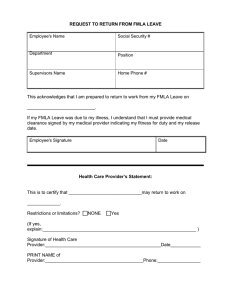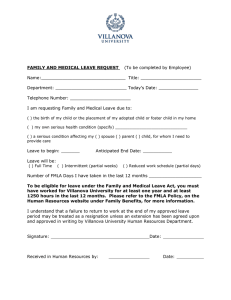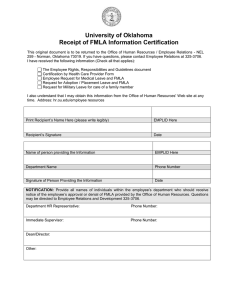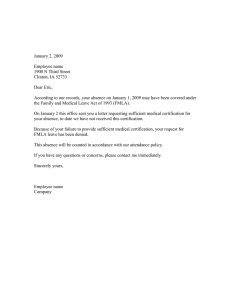Angelo State University
advertisement
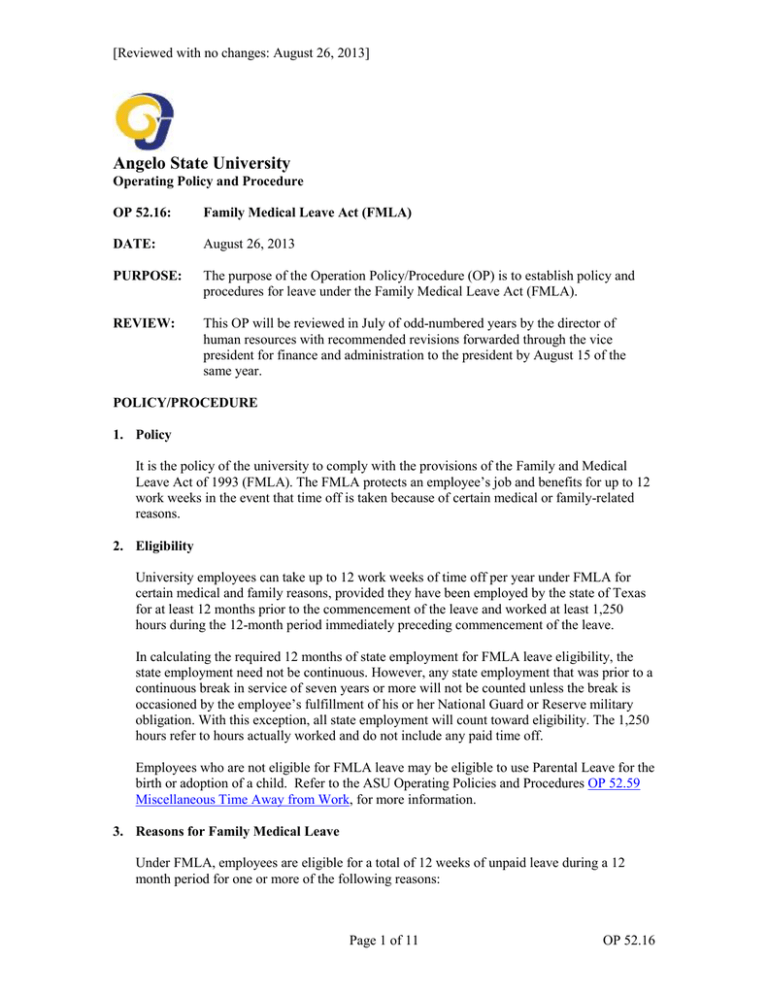
[Reviewed with no changes: August 26, 2013] Angelo State University Operating Policy and Procedure OP 52.16: Family Medical Leave Act (FMLA) DATE: August 26, 2013 PURPOSE: The purpose of the Operation Policy/Procedure (OP) is to establish policy and procedures for leave under the Family Medical Leave Act (FMLA). REVIEW: This OP will be reviewed in July of odd-numbered years by the director of human resources with recommended revisions forwarded through the vice president for finance and administration to the president by August 15 of the same year. POLICY/PROCEDURE 1. Policy It is the policy of the university to comply with the provisions of the Family and Medical Leave Act of 1993 (FMLA). The FMLA protects an employee’s job and benefits for up to 12 work weeks in the event that time off is taken because of certain medical or family-related reasons. 2. Eligibility University employees can take up to 12 work weeks of time off per year under FMLA for certain medical and family reasons, provided they have been employed by the state of Texas for at least 12 months prior to the commencement of the leave and worked at least 1,250 hours during the 12-month period immediately preceding commencement of the leave. In calculating the required 12 months of state employment for FMLA leave eligibility, the state employment need not be continuous. However, any state employment that was prior to a continuous break in service of seven years or more will not be counted unless the break is occasioned by the employee’s fulfillment of his or her National Guard or Reserve military obligation. With this exception, all state employment will count toward eligibility. The 1,250 hours refer to hours actually worked and do not include any paid time off. Employees who are not eligible for FMLA leave may be eligible to use Parental Leave for the birth or adoption of a child. Refer to the ASU Operating Policies and Procedures OP 52.59 Miscellaneous Time Away from Work, for more information. 3. Reasons for Family Medical Leave Under FMLA, employees are eligible for a total of 12 weeks of unpaid leave during a 12 month period for one or more of the following reasons: Page 1 of 11 OP 52.16 [Reviewed with no changes: August 26, 2013] a. The serious non-work-related or work-related health condition of the employee that prevents the employee from performing his or her job; b. The need to care for a spouse, child, or parent of the employee with a serious health condition; c. The birth of a child and care after birth during the child’s first year of life; d. The placement with the employee of a child for adoption or foster care during the first year following placement. e. A qualifying exigency arising out of the fact that the employee’s spouse, son, daughter, or parent is a covered military member on active duty (or has been notified of an impending call or order to active duty) in support of a contingency operation. When an employee is taking leave to care for a family member or due to his or her own serious health condition, the employee may be required to support the leave request with a medical certification from the health care provider. If the university does not agree with the medical certification, a second opinion at the university’s expense may be obtained. If the two opinions disagree, a third opinion may be obtained at the expense of the university and that opinion will be the final determination. 4. Eligible Family Member An employee may take FMLA time off to care for the serious health condition of a spouse, dependent child, or parent. a. Spouse A spouse, defined in accordance with the Texas Family Code, includes qualified common law marriages as defined in the Code. Note: Unmarried domestic partners (same or opposite sex) are not qualified for family leave to care for their partners. b. Son or Daughter (Child) For purposes of FMLA leave taken for birth or adoption or to take care of a family member with a serious health condition, a son or daughter refers to the biological, adopted, foster child, stepchild, legal ward of an employee, or the child of an employee when the employee is standing in loco parentis to a child who is under 18 years of age, or 18 years of age or older, and is incapable of self care because of mental or physical disabilities. Incapable of self care is defined as requiring active assistance or supervision to provide daily self care in three or more activities of daily living. c. Parent A parent is the biological, adoptive, step, or foster father or mother of an employee or an individual who stood in loco parentis to an employee when the employee was a child. Note: This definition does not include parents “in-law.” Page 2 of 11 OP 52.16 [Reviewed with no changes: August 26, 2013] d. Next of Kin of a Covered Service Member Next of kin of a covered service member is the nearest blood relative other than the covered service member’s spouse, parent, son, or daughter. This provision is only applicable for military family leave to care for a member of the Armed Forces for a serious injury or illness incurred in the line of duty. Proof of next of kin should be provided as required by law. 5. Serious Health Condition of Employee or Family Member According to the FMLA, a “serious health condition” means an illness, injury, impairment, or physical or mental condition that involves one of the following: a. Inpatient care (i.e., an overnight stay in a medical facility such as a hospital), including any period of incapacity or any subsequent treatment in connection with the inpatient care; or b. “Continuing treatment” by a health care provider that includes any period of incapacity as a result of a health condition lasting more than three (3) consecutive days and any subsequent treatment or period of incapacity relating to the same condition that also includes: (1) Treatment by a health care provider two or more times within 30 days of the first day of incapacity; or (2) Treatment by a health care provider on at least one occasion that results in a regimen of continuous treatment under the supervision of the health care provider. Only taking over-the-counter medication is not considered a regimen of treatment. (3) These treatments mean an in-person visit to a healthcare provider. The first in-person treatment visit must take place within seven days of the first day of incapacity. (4) Whether additional treatment visits or continuing treatment regimen is needed within the 30-day period shall be determined by the health care provider. c. Pregnancy or Prenatal Care d. Chronic Conditions that: (1) Require periodic visits of no less than two times per year for treatment by a healthcare provider; (2) Continue over an extended period of time; (3) May cause episodic rather than continuous incapacity; or (4) Would likely result in an absence of work for more than three days. e. Permanent or Long-term conditions f. Conditions requiring multiple treatments Page 3 of 11 OP 52.16 [Reviewed with no changes: August 26, 2013] g. Treatment of substance abuse may be included under FMLA where a stay at an in-patient treatment facility is required. However, absences due to an employee’s use of a substance without undergoing treatment, does not qualify for FMLA time off. The inclusion of substance abuse under the serious health condition definition does not prevent the university from taking any employment action against an employee who is unable to perform the essential functions of the job provided the institution complies with the Americans with Disabilities Act and does not take action against the employee because such employee exercises his or her rights under the FMLA. Some examples of serious health conditions include: (1) Heart attacks; (2) Heart conditions; (3) Most cancers requiring extensive therapy and surgical procedures; (4) Strokes; (5) Respiratory conditions; (6) Appendicitis; (7) Pneumonia; (8) Emphysema; (9) Severe nervous disorders; (10) Injuries caused by serious accidents on or off the job; (11) Severe morning sickness; (12) Prenatal care; (13) Childbirth and recovery from childbirth; (14) Back conditions requiring extensive therapy or surgical procedures. The FMLA is not intended to cover short-term conditions for which treatment and recovery are brief. It should also be noted that the FMLA does not restrict or modify any federal or state antidiscrimination rules or Angelo State University’s obligation to comply with the Americans with Disabilities Act. 6. Childbirth, Child Care, and Child Adoption An employee’s entitlement to leave for the birth or placement of a child expires twelve months after the birth or placement. There is no medical certification required if an employee is taking leave for the birth of a child. Documentation to support child placement for adoption or foster care may be required. In some cases, time off for birth or placement for adoption can be taken prior to the actual birth or adoption. This will occur when there is a need for prenatal Page 4 of 11 OP 52.16 [Reviewed with no changes: August 26, 2013] care or the mother is no longer able to work before childbirth or for court appearances, counseling or home visits in the case of a placement of a child for adoption. 7. Intermittent Leave Intermittent Leave is FMLA leave that is taken in separate blocks of time because of a single qualifying reason. FMLA time taken due to the serious health condition of the employee or a member of the employee’s family may be taken on an intermittent basis. There is no minimum limitation on the number of hours of intermittent leave that may be taken, i.e., the leave may be taken in increments of two hours, four hours, etc., provided that proper notice has been given if the need for the leave is foreseeable. The accumulated time taken on intermittent basis may not exceed the 12 weeks. When an employee has requested intermittent leave, the department may transfer the employee to another position with equivalent pay and benefits if the employee is qualified for the position and if it better accommodates the recurring periods of leave more so than the employee’s current position. Intermittent leave to take care of a newborn child who does not have a serious health condition is not a right under FMLA. However, departments do have the discretion to allow their employees to take FMLA on an intermittent basis to take care of a newborn child who does not have a serious health condition. 8. Military Family Leave Entitlements a. Military Caregiver Leave Eligible employees, who are a spouse, son, daughter, parent, or next of kin of a current member of the Armed Forces, including a member of the National Guard or Reserves, may take up to 26 weeks of job-protected leave in a single 12-month period to care for a covered service member who is undergoing medical treatment, recuperation, or therapy, is otherwise in outpatient status, or is otherwise on the temporary disability retired list for a serious injury or illness incurred in the line of duty on active duty. Notice must be provided as is reasonable and practicable. b. Qualifying Exigency Leave Eligible employees may receive up to 12 weeks of FMLA leave in a single 12-month period while the employee’s spouse, son, daughter, or parent is on active duty or called to active duty for one or more of the following qualifying exigencies: (1) Short notice deployment- Call to duty on seven days or less notice; (2) Military and related events- Official military events and ceremonies and other military-sponsored programs or briefings related to the covered military member; Page 5 of 11 OP 52.16 [Reviewed with no changes: August 26, 2013] (3) Child care duties and school activities- To arrange or provide childcare on an urgent or immediately needed basis (not routine, regular, or everyday child care), and to arrange for school and attend school-related meetings for a covered military member’s child; (4) Financial and legal arrangements- To make financial or legal arrangements to address the covered military member’s absence while on active duty or call to active duty or to act as the covered military member’s representative before a government agency for purposes of obtaining, arranging, or appealing military service benefits while on active duty or for 90 days following termination from active duty; (5) Counseling- To attend counseling for the covered military member or his/her child; (6) Rest and recuperation- An employee may take up to five days leave to spend time with a covered military member on short term or temporary rest and recuperation leave; (7) Post-deployment activities- To attend ceremonies or events related to the covered military member’s termination from active duty status or to address issues that arise from the death of a covered military member; (8) Additional activities- To address or attend other events that arise out of the covered military member’s active duty or call to active duty, provided that Angelo State and the employee agree that the leave shall qualify as an exigency and agree to the timing and duration of the leave; (9) Notice of the intent to use Military Family Leave Entitlements must be provided as is reasonable and practicable. 9. Married Employees Working for the University For married employees who work for the university, the total combined amount of FMLA leave between the two employees cannot exceed 12 weeks. This limitation applies only for those cases involving the birth or placement of a child. In cases involving sickness or injury, this limitation does not apply. For married employees who work for Angelo State, the total combined amount of FMLA leave between the two employees cannot exceed 26 weeks for the care of a covered military family member. 10. Workers’ Compensation FMLA-eligible employees will be placed on FMLA by the Office of Human Resources in conjunction with any Workers’ Compensation Insurance (WCI) leave resulting from a workrelated injury or disease. Please refer to OP 52.58 Workers' Compensation Insurance for more information regarding work-related injury or illness. Page 6 of 11 OP 52.16 [Reviewed with no changes: August 26, 2013] 11. Leave Administration under FMLA In accordance with the law, the university will allow an employee to take up to 12 work weeks of time off in a 12-month period. The 12 month period begins from the date of the employee’s first FMLA-related date of absence or the date that the Office of Human Resources approves the time off under FMLA, whichever is later. During the FMLA period, employees are required to first use their available paid leave (sick and vacation), if any, and then will be placed on a non-paid status (leave without pay) for the remainder of the 12 week FMLA leave entitlement, if necessary. The exception is for Workers’ Compensation cases where the employee has an option to use or not use accrued leave. The FMLA regulations state that if an employer provides more benefits than required by the Act, the FMLA will not restrict those benefits. Therefore, benefits such as the Sick Leave Pool or workers’ compensation may be used in conjunction with and count towards the 12 weeks of FMLA leave. Also, employees may continue to use the balance of their leave entitlements, even if such balance exceeds the 12 week period allowed by FMLA. The university is not permitted to count paid leave that was not for an FMLA reason against an employee’s FMLA leave entitlement. For example, if an employee has taken sick leave on various occasions for a cough, flu, or condition that is not an extended illness, those days may not be counted towards the 12 week entitlement for a bona fide FMLA reason. If, however, the employee is expecting the birth of a child and has taken leave prior to the birth for prenatal care, the university may require the employee to use their sick and vacation leave and limit the total amount of time away from work to a total of 12 weeks. A holiday that occurs during a week off under FMLA is counted as part of FMLA leave. However, if the university closes for a few days (due to inclement weather or emergency closure, for example), then that period would not count toward an employee’s FMLA leave. If at the end of the FMLA period an employee has not returned to work and has exhausted all of his or her leave and FMLA entitlements, employment with the university may be terminated. 12. Procedures for Employees Requesting FMLA Time Off a. All FMLA leave requests must be presented by the employee to the Office of Human Resources. It is not required that the request specifically mention FMLA. The request can be either verbal or in writing. The request must be made with at least a 30 day advance notification before the time off commences. If the event is not foreseeable, the request should be made as soon as possible within one to two business days of when the employee learns of the need for time off. Upon notification of the employee’s intent to use FMLA leave, the Office of Human Resources will provide the employee the form Notice of Eligibility and Rights and Responsibilities (FMLA). b. A medical certification from the employee’s treating physician can accompany the request, or, the Office of Human Resources may request a medical certification. If requested, the employee has 15 days from the date of the human resources’ request to provide a medical certification. If a medical certification is necessary, employees may use the form, FMLA Certification of Health Care Provider for Employee’s Serious Health Page 7 of 11 OP 52.16 [Reviewed with no changes: August 26, 2013] Condition or Certification of Health Care Provider for Family Member’s Serious Health Condition. 13. Procedures for Departments for Responding To and Placing Employees under FMLA The Office of Human Resources is responsible for determining eligibility and for responding to the employee’s request for time off under FMLA. Human resources is also responsible for continued communication with the employee and complying with the recordkeeping requirements of the law. a. The Office of Human Resources shall determine the eligibility of the employee to qualify for FMLA time off and the eligibility of the qualifying event for the FMLA leave request. If the employee and qualifying event are eligible under FMLA leave, the employee shall be granted the leave. If eligible, human resources will notify the employee of the approved FMLA time off within two (2) working days of the employee’s request. Human resources’ response will be made using the forms, Designation Notice (FMLA). If granted, the FMLA time off will be effective from the date of the employee’s initial FMLA-related absence or the date that human resources approves the time off under FMLA, whichever is later. The original form(s) will be given to the employee with a copy sent to the employee’s supervisor and a copy kept in the Office of Human Resources. All related forms and procedures are available in the Office of Human Resources or online at: http://www.angelo.edu/dept/human_resources/ In some situations, the Office of Human Resources will initiate commencement of FMLA. For example, if the employee is involved in a car accident and is incapacitated and cannot request FMLA, or if the employee suffers a work-related injury, then the department can notify human resources about the potential for an FMLA situation. Please refer to OP 52.58 Workers' Compensation Insurance for more information regarding work-related injury or illness. Should a dispute arise between the employee and the employee’s department, with regard to the requested FMLA leave or the terms and conditions of the leave, either the employee or the department may appeal such disputes to the director of human resources. The decision of the director of human resources shall be final in the resolution of such disputes. 14. Recordkeeping Federal recordkeeping policies require that all FMLA leave be indicated as such on time and leave records and other documents. It shall be the responsibility of the Office of Human Resources to maintain leave records for any employee on FMLA leave. The leave time taken by the employee shall be recorded on institutional records as leave with pay under FMLA (using the employee’s available leave entitlements) or leave without pay under FMLA. Paid leave under FMLA is taken from the employee’s leave balances and must be recorded in the institutional records. Unpaid leave under FMLA will be entered in the institutional records as leave without pay. All original requests for FMLA must be maintained by the Office of Human Resources. The following information must be kept regarding FMLA time off: Page 8 of 11 OP 52.16 [Reviewed with no changes: August 26, 2013] a. Records of no less than three years which contain the basic payroll and identifying employee data, including name, address, occupation, rate of pay, terms of compensation, hours worked, additions and deductions to wages, and total compensation. This information is kept in the institutional human resource management system. b. The dates that family leave is taken by an employee. The leave must be designated in the records as leave taken under FMLA. This information is kept by the Office of Human Resources. c. Documentation of leave taken under FMLA in increments of less than one full day (intermittent leave), as well as hours of the leave. This information is kept by the Office of Human Resources d. Copies of employee notices of leave furnished to the department or human resources under FMLA, if in writing, and copies of all general and specific notices given to employees under FMLA and copies of the regulations. This information is kept by human resources. e. Any documents describing employee benefits or university policies. This information is kept by human resources. Also, written and electronic records regarding the taking of paid and unpaid leave. This information is kept by the department and human resources. f. Premium payments of employee benefits g. Records of any dispute between the employee and the department regarding any designation of leave as FMLA leave, including any written statements from the department or the employee and the reasons for the designation and disagreement. This information is kept by human resources. It should be noted that records and documents relating to medical certifications, recertification, and medical histories of the employee or the employee’s family members will be maintained in separate files and treated as confidential medical records. The medical information may be disclosed to: supervisors and managers, if needed, regarding work restrictions; the first aid and safety personnel if the employee’s physical and medical conditions require medical treatment; and governmental officials investigating compliance with FMLA. 15. Benefit Status and Health Insurance Coverage/Premium Payments during FMLA Employees on paid leave under FMLA will continue their health insurance coverage on a shared cost basis between the university and the employee, if applicable. The employee’s share of the cost, if any, will be deducted from the employee’s paycheck. When an employee is on unpaid leave under FMLA, the university will continue to contribute its share of premium sharing for medical insurance and the employee will pay his or her share of the cost, if any, through the Employee Retirement System (ERS). For example, if the employee has family medical coverage, the university will continue sharing the cost of the premiums with the employee at the “employee plus family” rate. The full-time or part-time employee, on unpaid leave, may choose to pay his or her out of pocket cost of the premiums for the current insurance coverage. Should a full-time employee choose not to continue the Page 9 of 11 OP 52.16 [Reviewed with no changes: August 26, 2013] current coverage or fails to pay his or her cost, the level of coverage will be reduced to no less than employee-only coverage. The employee has 30 days from the due date to pay his or her insurance premium. If a fulltime employee does not make payment within 30 days, the university will reduce the employee’s current coverage to no less than employee-only coverage effective the first date of the month for which the payment was due. Prior to expiration of the 30 day period, the university will notify the employee of the cancellation of insurance coverage. If the university discontinues health coverage as a result of non-payment of insurance premiums and the employee returns from FMLA time off, the employee’s benefits must be restored to at least the same level and terms as were in place when the FMLA period commenced. Therefore, the returning employee shall not be required to meet any qualification requirements, such as a waiting period or pre-existing condition requirements, when the employee has failed to continue health coverage for non-payment of premiums. In accordance with FMLA regulations, the university may be entitled to recover its share of the cost of non-health care benefits, such as life insurance, short-term disability, etc., from the employee who returns to work from FMLA time off. Employees on FMLA leave are not entitled to accrue state service credit for any full calendar month(s) of FMLA leave without pay and shall not accrue vacation or sick leave for such months. Furthermore, any full calendar months of FMLA leave without pay shall not be included in the calculation of the six continuous months of employment set forth under vacation leave. 16. Employee Responsibility It is the employee’s responsibility to provide all requested documentation to the Office of Human Resources in a timely manner as described above. Once on FMLA leave, the employee must keep the Office of Human Resources informed of his/her status at least once every two weeks. If an employee does not contact his/her supervisor at least every two weeks to report their status, the employee may be contacted by ASU for this purpose. A family member may call in for the employee only if the employee is medically unable to do so. Employees granted FMLA leave are not permitted to perform work during regular working hours for another employer, attend training opportunities, or attend educational classes during regular working hours. 17. Returning to Work When an employee returns to work after taking leave under FMLA, he or she is entitled to be restored to the same position held when the leave started or to an equivalent position with equivalent pay within the provisions and limitations of the law. An equivalent position is one that has the same pay, benefits, and working conditions and involves the same or substantially similar duties and responsibilities and with the equivalent skill, effort, responsibility, and authority. Page 10 of 11 OP 52.16 [Reviewed with no changes: August 26, 2013] The university may require the returning employee to provide a work release notification from the employee’s physician before being allowed to work. 18. Termination of Employment Upon exhaustion of all leave and FMLA entitlements or if the employee fails to return to work upon expiration of the FMLA period, an employee may be terminated from employment with the university. All other university employment policies apply to employees regardless of FMLA status. 19. Employee Rights Employees who exercise their rights under the FMLA are entitled to do so without restraint and shall not be subject to discharge or discrimination by the institution. The university may not discriminate against an individual for having filed complaints, initiated any proceeding under or related to the FMLA, or given any information in connection with an inquiry or proceeding regarding the FMLA. Should a dispute arise between the employee and the department with regard to the requested FMLA leave or the terms and conditions of the leave, either the employee or the department may appeal such disputes to the director of human resources. The decision of the director of human resources shall be final in the resolution of such disputes. If an employee’s rights may have been violated, he or she should first consult human resources and/or file a grievance in accordance with the grievance policy. The FMLA provides that an employee may file a complaint with the Department of Labor or file a private lawsuit against the employer to obtain damages and other relief if an employee’s FMLA rights have been violated. 20. Notice Requirements a. Angelo State University is required to post a notice where it can be seen by employees and applicants that explains an employee’s rights and responsibilities under the FMLA. The text must be fully legible and in languages in which significant portions of the workers are literate. Electronic posting is sufficient as long as it meets all requirements. A prototype notice is available on the Department of Labor website. The notice is available at all system member human resources offices. b. Angelo State must also provide this notice to each employee to ensure that the employee is aware of FMLA obligations. New employees will be provided a copy of the general notice upon hire. Distribution may be accomplished electronically. 21. Forms and Procedures All related forms and procedures are available on the Office of Human Resources website at: http://www.angelo.edu/dept/human_resources/ Page 11 of 11 OP 52.16
